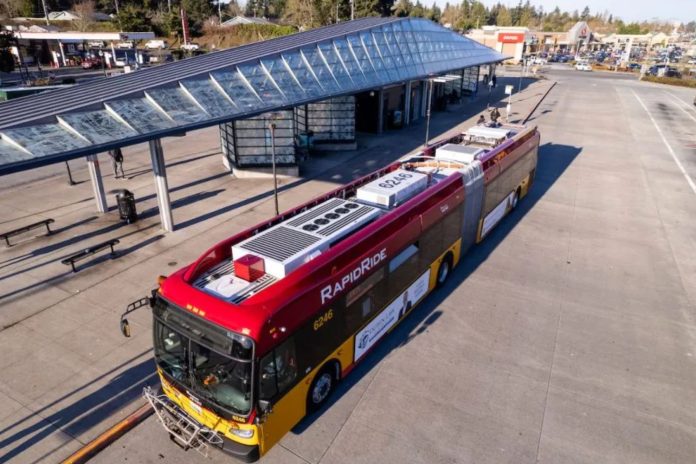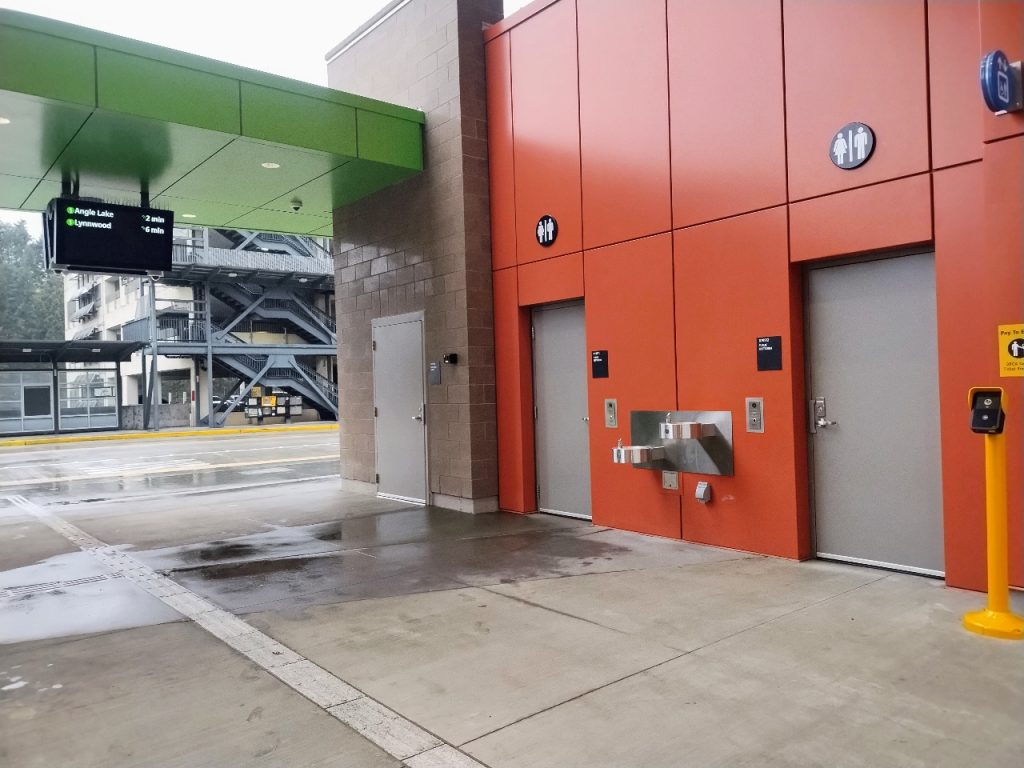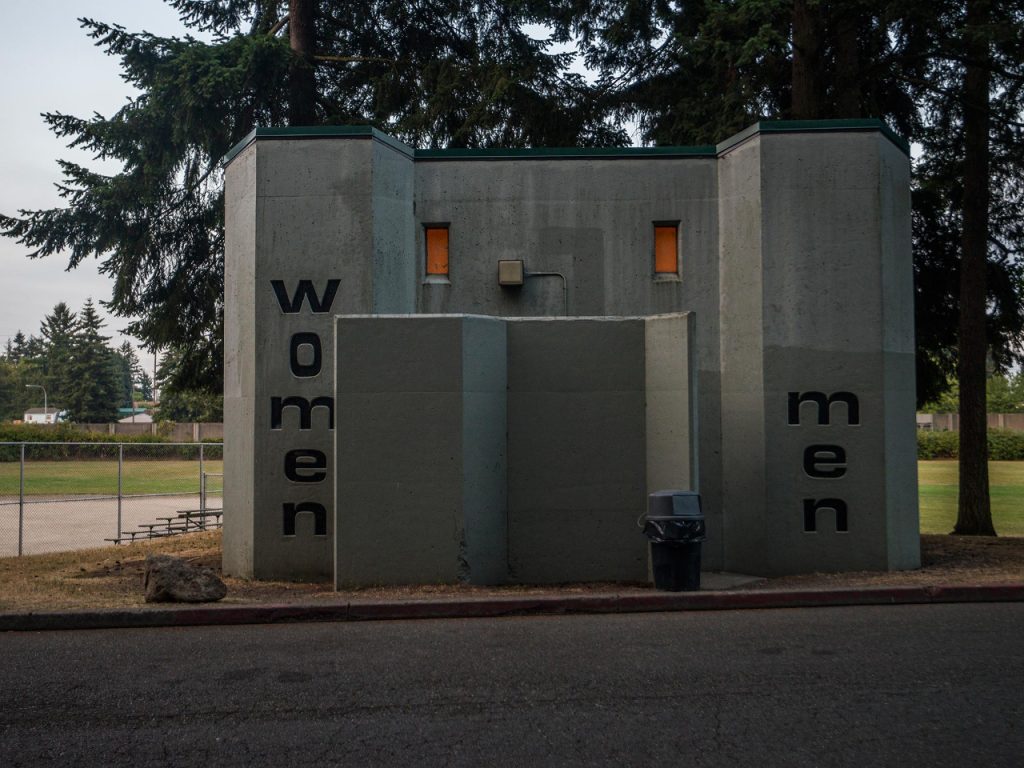
Bus riders at Aurora Village and Burien Transit Centers will continue to have access to public restroom facilities into 2025, thanks to the King County Council’s budget allocation set to adopted this week. The two portable restrooms at those transit centers are the only public restroom facilities that King County Metro operates anywhere in its bus system.
The scarcity of public restrooms makes it hard for riders to address their basic bodily functions despite Metro’s status as the largest transit agency in Washington State and the 10th busiest in the US. While the budget keeps the restrooms open as a stopgap, it’s unclear if Metro is on its way to expanding restroom access beyond those two places.
The County had been set to close the two restrooms at the end of 2024 — after only a year in operation — since initial funding earmarked by the County Council had been set to ran out. So far, County Executive Dow Constantine has shown little interest in seeing the program continue, much less expand, and did not propose funding in his budget. To justify his inaction, Constantine has cited existing county code that adds a very high bar to adding restrooms at Metro facilities, criteria that virtually no locations currently meet.
The King County Council opted to allocate an additional $500,000 in funding for 2025 to keep the facilities open, with additional direction to County leaders to explore what it would take to create permanent restrooms at these two locations. Though the budget language specifically directs the County “to provide a modified security model that is different from and less costly than the current 24/7 dedicated security model,” it leaves the question of how to do that open-ended.
Keeping the restroom in place at Aurora Village Transit Center has been a priority for County Councilmember Rod Dembowski, whose district includes it.
“This is about, in my view, operating a system that is responsive to folks’ needs,” Dembowski said. “We invite hundreds of thousands of folks every week onto our transit system, and I will say, at the recent openings of the light rail stations in Shoreline, it was wonderful to see public restrooms built in there, and they’ve been well-received.”
The biggest barrier to keeping the restrooms open has been cost. To keep restroom users safe, the County assigned additional security to monitor the restrooms 24/7, spending $33,000 per restroom per month, dollars that dwarfed any of the other elements of the pilot.
For the most part, the restrooms have been positively received by nearby community members. While initial data suggested that the restrooms seemed to be having a positive impact on cleanliness at the two transit centers, usage has been low. Given their recent installation, many riders likely are not even aware that they exist, or are not in the habit of relying on them.

Another amendment proposed by Councilmember Teresa Mosqueda, whose district covers the Burien Transit Center, seems to have an eye toward the longer-term future of the restroom program. It asks for a plan to create permanent restrooms at these two transit centers themselves, with direct questions about which county agency should be responsible for taking ownership of the facilities. It also asks the County to look at external partners that could help the County maintain them, including “local jurisdictions, private businesses, community organizations, or other transit agencies.”
None of the budget language approved this week mentions any future restrooms elsewhere in the system, but it’s clear that getting it right in Shoreline and Burien is a necessary precursor to expanding anywhere else.
“We recognize that the ability for patrons to be able to use the restroom is a basic human need,” Mosqueda said. “And we greatly appreciate that the Metro team has been working to pilot restrooms at Shoreline and in Burien in the past. We know that there’s some lessons learned there for how to potentially reduce costs, as it relates to a 24/7 security and monitoring, and looking at creative ways to reduce the costs in the future, is really what this amendment is intended to do.”

“I so appreciate that we step into this space. It’s a space that has been discussed at Sound Transit, at Metro, and our colleagues at transit agencies north and south of us in the region, and nobody’s really solved it. Everything that has been said about the need is 100% true,” Councilmember Claudia Balducci said. “At the same time, providing it can be very expensive, it’s very hard to keep them maintained.”
Balducci raised potential concerns about investing in restrooms that don’t end up being utilized, citing a former restroom facility at Bellevue Transit Center that eventually closed. “I think we should work with partners to unlock the answer to the bathroom problem,” she said.
“For some folks, this is a convenience,” Dembowski said. “But for a lot of other folks, it’s a necessity. Some folks have medical conditions that make this a more dire situation than others, and I think it’s about being aware of that and being compassionate, and I think it’s consistent with Metro’s values to move in this direction.”
Ryan Packer has been writing for The Urbanist since 2015, and currently reports full-time as Contributing Editor. Their beats are transportation, land use, public space, traffic safety, and obscure community meetings. Packer has also reported for other regional outlets including BikePortland, Seattle Met, and PubliCola. They live in the Capitol Hill neighborhood of Seattle.

